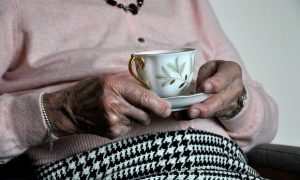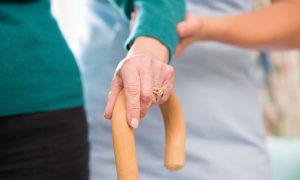Latest News
New support for living with dementia in Crystal Palace and Gispy Hill – and their carers
We meet at 10.30am-12.30pm at the Goodliffe Hall, Christ Church, 1 Highland Rd, SE19 1DP
The second support we offer is in collaboration with St Christopher’s Hospice ‘Compassionate Neighbours’ programme.
We match local volunteers, who have been specifically trained in dementia, with people living with dementia and their carers, to regularly visit them and offer friendship and support. [This is only available for people living in Crystal Palace or Gipsy Hill.]

Health department ‘ignoring UK life expectancy concerns’
The academics said that in recent years there had been “one of the greatest slowdowns [in life expectancy improvements] for both sexes since the 1890sâ€, with rates even declining for some groups.
Given the lack of alternative reasons for the decline, they said they were were calling for an immediate investigation into a potential link between the death rates and underfunding of the NHS and social care.
They asked how ministers could justify pushing up the state pension age in the current climate, especially as the Institute and Faculty of Actuaries had taken notice of the trend and adjusted their projections.
The four senior academics said, however, their warnings were falling on deaf ears. “Concerns about life expectancy have been raised by academics at least twice in 2017, and twice the DoH’s responses have been disappointing, even attacking the researchers involved,†they have written in the article for the Journal of Epidemiology and Community Health.
They said it was indisputable that life expectancy had stalled in England and Wales, with suspicions that prolonged austerity mattered a great deal.
Debbie Abrahams, the shadow work and pensions secretary, saidministers had highlighted “projected continued increases in life expectancy†to justify accelerating the rise in the state pension qualifying age to 68 years.
“The evidence from several analyses is clear: increases in life expectancy have slowed markedly and at older ages may even be reversing,†Abrahams told the Guardian, warning that women were most adversely affected by the slowdown and calling for an independent inquiry. “The government must think again.â€
One of the academics, Martin McKee, a professor at the London School of Hygiene and Tropical Medicine, said some might argue that Britain had reached a point where you would expect life expectancy to plateau but said: “We are a long way off that.â€
He pointed out that Scandinavian countries and Japan were examples of places where life expectancy was well ahead of the UK. With no natural disaster to explain the phenomenon, and flu epidemics at most contributing only partly to the trend, McKee said it was imperative to look at “severe cuts in social care†and the evidence that the “NHS was struggling to copeâ€.
He added: “Recent developments call into question current proposals to increase the state pension age.â€
Danny Dorling, a professor at the school of geography and the environment at the University of Oxford, and co-author of the report, said: “People really are not crying wolf. This is very bad, and it is worse than anywhere else in Europe. There are some European countries, especially Norway and Finland, where progress in mortality rates just carries on as normal and they continue to see life expectancy rise and rise. They are doing the best and we, in the UK, the worse when it comes to progress since 2010.â€
With pensions, said Dorling, people ought to know that if the trend continued people in the UK could expect to experience among the very lowest life expectancies in Europe, with a larger proportion dying before receiving a pension or within a few years of the payments.
Dorling called the situation entirely preventable, and that ministers did not see it as a priority.
Following reports that the life expectancy gap had widened between England’s richest and poorest neighbourhoods, Labour said it was planning to make health inequality a big focus of 2018, the 70th anniversary of the NHS.
The Conservative health select committee chair, Sarah Wollaston, also admitted it was a serious issue, particularly concerning “the health inequality that is highlighted, and regional differencesâ€.
But a health department spokesperson said the slowdown still represented an overall improvement and insisted that funding was being put into the system. He said: “Life expectancy continues to increase, and as the authors themselves point out, it is impossible to attribute changes to spending alone – but we gave the NHS top priority in the budget with an extra £2.8bn, on top of a planned £10bn a year increase by 2020/21. This is in addition to £2bn more for social care, and the £1bn we spend each year on health research.â€

What new research tells us about telecare use in English local authorities
New research
The UTOPIA (Using Telecare for Older People In Adult social care) project, led by staff from the Social Care Workforce Research Unit at King’s College London, has produced new findings about why and how telecare is used for older people. They raise the possibility that it might not have been telecare itself but the ways it was used that led to the WSD findings. The study also suggests that given the strategic importance many councils now place on telecare, the infrastructure needed to implement it effectively may not be as robust as needed.
The study involved a survey of all 152 English local authorities with social care responsibilities between November 2016 and January 2017 with a response rate of 75%. Key findings found that only a minority of local authorities said their telecare strategies had been produced collaboratively with local NHS or other partners and in most, telecare did not seem to be referenced within their carers’ strategy.
A large proportion of local authorities did not appear to have telecare services accredited to national/international codes or standards. Though many participants felt telecare saved their local authority money, most were unable to offer clear evidence of this. All participants saw telecare as playing a major role in keeping people safe by preventing accidents – and thereby maintaining independence – and to support the role of family carers. There was much less focus on the use of telecare to promote social contact, alleviate loneliness and enable older people to spend their leisure time in ways they found meaningful.
Some local authorities had integrated telecare within operational teams (so assessments for and decisions about telecare were made by care managers). Elsewhere, specialist workers in different teams assessed for and deployed telecare. In some places, only one professional group – for example, care managers – were responsible for assessing for telecare, and in others assessments could be carried out by a range of ‘front-line’ professionals.
Though responses suggested that assessments were relatively holistic, there were also differences. For example, though over 90% said they focused on the person’s ability to mobilise and move around, just over 50% said they considered the ability of the telecare recipient to problem solve. Most of the assessment tools used had not been validated to ensure they measured what they were intended to measure.
The survey also revealed assessments were not always carried out before telecare was deployed (for example, to support hospital discharge). In a fifth of local authorities there was doubt as to whether an assessment was subsequently completed. Though most local authorities offered training for telecare assessors, this was usually provided by telecare manufacturers and suppliers, and training was often very short.
Almost no training was delivered by a college or university, or led to any formal qualification. Most local authorities bought their telecare from a small number of manufacturers or suppliers and there seemed to be a tendency to use a limited range of devices. Not all local authorities had a paid 24/7 response service and where a family carer could not be identified to act as a responder, telecare was often not offered.
Implications
The survey findings offer an up-to-date description of telecare use for older people.
The overall response rate means the findings are fairly reliable and have a number of implications. The provision of telecare before assessment is likely to lead to a poor match between need and device, and the lack of involvement of the recipient and their family in decisions about what to provide may lead to the subsequent abandonment of telecare by some people. The quality of training offered to telecare assessors was very varied.
The reliance on telecare manufacturers to provide a great deal of this training, and its short duration, suggests much of it may have been about how a device worked, rather than deeper questions about whether it is the best solution to the identified need. Some of this might have essentially been a marketing opportunity as much as training. The lack of a wide range of devices in some local authorities may also be a problem, as the available devices might not fully meet the actual needs.
Investment in training, and the development of different purchasing arrangements to enable a wider range of devices to be obtained would help. Our findings suggest some local authorities should consider what they need to do to provide telecare services which deliver the outcomes everyone wants.
Further details
The full report of findings from this survey is available for free. The first author and contact for any queries is John Woolham, senior research fellow at the Social Care Workforce Research Unit, at [email protected].

Migrant adult social care staff ‘add £4.4bn to English economy’
Now in its second year, 1DWU celebrates the contribution to the UK of migrants, many of whom say they feel unwelcome since an escalation in pro-Brexit rhetoric after the 2016 referendum.
The figures, from the New Economics Foundation thinktank, show that if migrants in the sector stopped working for one day there would be a £17m shortfall.
Saturday’s event is an opportunity for UK residents and migrants to stand together. Many migrants work in the NHS and social care sector and this year’s 1DWU includes a particular focus on them.
More than 60 events including rallies, communal meals and mini-festivals are planned under the slogan “Proud to be a migrant. Proud to stand with migrants.â€
1DWU was launched last year in an attempt to make the debate about migration more positive amid increasing levels of hate crime, which has left many migrants feeling threatened.
Organisers are concerned about the exodus of migrants from the NHS and social care sector, with the proportion of EU staff leaving the NHS rising significantly since 2016.
Matt Carr, the lead organiser of 1DWU, said: “Migrants make a huge contribution in so many ways to life in Britain, not least in the adult social care sector. But anti-migrant rhetoric, coupled with the uncertainty that the government’s approach to Brexit has unleashed, is leaving many people who have come to the UK to live and work feeling unwelcome and marginalised.
“I want to live in a country where we treat everyone, wherever they come from, with decency and respect. For 1DWU across the country, people are coming together to send a clear message that we reject the politics of hate and division.â€
Cities including Cardiff, Portsmouth, Hastings, Dumfries and York will host events. Various organisations are backing 1DWU including Open Britain, the TUC and Royal College of Nursing.

More than a million benefits sanctions imposed on disabled people since 2010
A comprehensive analysis of the treatment of unemployed disabled claimants has revealed that they are up to 53% more likely to be docked money than claimant who are not disabled. This raises serious concerns about how they and their conditions are treated.
The findings, from a four-year study by academic Ben Baumberg Geiger in collaboration with the Demos thinktank, will cause worry that a government drive to help a million more disabled people into work over the next 10 years could lead to more unfair treatment.
Sanctions – the cutting or withholding of benefits – are applied as a punishment when claimants infringe the conditions of their payments by, say, as missing appointments or failing to apply for enough jobs.
While the sanctions regime has been championed by the government as a means of encouraging people to take a job or boosting their chances of finding one, most experts consulted as part of the Demos project concluded that conditionality has little or no effect on improving employment for disabled people. There was also widespread anecdotal evidence that the threat of sanctions can lead to anxiety and broader ill health.
The study found that disabled claimants receiving jobseekers’ allowance – given to people who are out of work – were 26-53% more likely to be sanctioned than claimants who were not. Those hit by sanctions reported that the disparity arose because jobcentre staff failed to take sufficient account of their disabilities.
However, a spokesman for the Department for Work and Pensions said it did not recognise these figures: “If someone has a health condition, we work with them to reduce what they need to do, and people are always supported to meet the requirements of a tailored claimant commitment, which they agree with their work coach. This sets out what is expected of them in return for the support they will receive. Sanctions are only used when someone has failed to meet these requirements without good reason – this is in a minority of cases and people are given every opportunity to explain why they have failed to do so before a decision is made.â€
The new study found that more than 900,000 JSA claimants who report a disability have been sanctioned since May 2010. People who claim a different benefit, employment and support allowance, and have been placed in a work-related activity group – which requires them to attend jobcentre interviews and complete work-related activities –can also be sanctioned. The research found that more than 110,000 ESA sanctions have been applied since May 2010.
The findings have caused alarm among charities, many of which have dealt with cases in which disabled people complained of poor treatment and a lack of understanding.
Mark Atkinson, chief executive at disability charity Scope, said: “Punitive sanctions can be extremely harmful to disabled people, who already face the financial penalty of higher living costs. There is no clear evidence that cutting disabled people’s benefits supports them to get into and stay in work.
“Sanctions are likely to cause unnecessary stress, pushing the very people that the government aims to support into work further away from the jobs market.â€
Polling for the Demos project found that while the public often supported the imposition of sanctions for disabled people, they did not back the way in which they were applied in practice.
A majority thought that disabled people’s benefits should be cut if they do not take a job they can do, but they were less supportive of sanctioning for minor noncompliance, such as sometimes turning up late for meetings. Even those who supported sanctions preferred much weaker punishments than those the government uses.
The research recommends a reduction in the use of so-called “benefit conditionality†for disabled people and a strengthening of the safeguards to ensure disabled people are not unfairly punished.
Polly Mackenzie, director of Demos, said it was now clear that the benefits system isn’t working for disabled people: “Conditionality is important in any benefits system, but when disabled people are so much more likely to be sanctioned, something is going wrong. Jobcentre advisers and capability assessors too often have a culture of disbelief about disability, especially mental illness, that leads them to sanction claimants who genuinely could not do the job they are being bullied into applying for.
“We need to think again about how we assess work capability. Employers also need to be better at adapting to disabled people’s needs so that more jobs can be done by people with fluctuating conditions.â€
This follows a damning report by the National Audit Office in 2016, which found that there was no evidence that sanctions were working. It also found a failure to measure whether money was being saved, and that the application of sanctions varied from one jobcentre to another.
‘There’s no room for compassion’
Nina Grant, 32
After she complained, her benefits were reinstated. “They didn’t apologise. They didn’t offer any explanation. If I hadn’t called them, it could have gone on for months. It made me feel like I was being punished for trying to contribute while disabled, and scared that they were going to use that as an excuse not to pay me.â€
The Londoner is reliant on a wheelchair outside her home, and finds it extremely painful even to use a pen most days. “I understand that people exploit the system, but this government treats disabled people with utter contempt.â€
Josie Evans, 42
Ten years ago Josie Evans was working as a nurse when she suddenly went into anaphylactic shock. After 41 further life-threatening attacks, she has been diagnosed with idiopathic anaphylaxis, which means she is extremely allergic to more than 100 antigens and triggers.
She relies on disability benefit to pay her rent and buy food but was sanctioned in 2016 after failing to send in a form on time: “The document was 20 pages long and I was in too much pain to write, because my hands were swollen from a recent allergic reaction I’d had.â€
She explained this and was told she could take her time. Ten days later, a letter arrived from her landlord saying her housing benefit had not been paid. She discovered all her disability benefits had been stopped because the form had been late. “I was scared. I knew I’d need to buy food in the next 48 hours, and I can’t use a food bank because of all my allergies.â€
It took weeks for her benefit to be reinstated, and she had to borrow money from her family. “It was so stressful it brought on an allergic attack. The people who work at the DWP simply do not understand the reality of what it’s like to be disabled. There is no room for compassion.â€

How To Handle An Aging Parent Who Is Developing Paranoia
The thing is, it reminded me of many of my formerly elderly clients who had similar situations. One client was convinced that her upstairs neighbor drilled a hole in his floor to watch her in the bathroom. There was no hole. Another elderly woman was convinced she had a stalker for 12 years who followed her from home to home and went into her apartment to steal things. He also watch her through the walls. Yet another client was convinced that the couple next door were sneaking into her home and moving things around.
The similarity between all of my elderly clients who were convinced they were being stalked or watched was that they all lived alone. They all truly believed these things were happening and some went as far as to call the police or report the incidents to their resident manager (if they lived in an assisted living facility).
Is Paranoia Common in the Elderly?
The onset of paranoia, delusions and hallucinations can happen in the elderly. Mild symptoms include imagining a caregiver stole their wallet when they merely misplaced it. More serious incidents include them seeing an intruder in their home. Although this may seem scary to you, the caregiver, the main danger is the action your elderly parent takes in the situation.
Common Causes for Paranoia in Elderly Parents
Whenever I have a new medical issue, I immediately consult Dr. Google and create a worse case scenario – which is the wrong thing to do! If you are noticing your elderly parent is experiencing paranoia, I highly recommend a visit to the doctor.
There are some causes of paranoia that you can ask their physician about during your visit (note – these are extreme causes, in most cases, the cause of paranoia is medication or illness):
- Medication side effect
- Untreated Urinary Tract Infection
- Cognitive Impairment
- Delirium
- Dementia
- Vascular Damage from a Stroke or Head Injury
- Late Onset Psychotic Symptoms from a Physciatric Condition
- Alzheimer’s Disease
- Brain Tumor
Can Paranoia in Elderly Be Treated?
The good news is, in most cases, your elderly parent can be treated for paranoia. A medical condition such as urinary tract infection may cause confusion, which could lead your aging parent to see or hear something that isn’t there. A problem with their hearing aide could cause them to hear things that aren’t there. Medication they take might cause hallucinations.
It is important to speak with your elderly parent’s doctor if they are experiencing paranoia or hallucinations. In many cases, it can be treated.
Tips for Caregivers on Handling Paranoia in Elderly Parents
It can be scary to hear your parent talk about the stalker next door or the upstairs neighbor sneaking into their home. Here are some tips for handling these conversations.
- Be respectful. Your parent truly believes these things are happening. Don’t tell them they are crazy or dismiss their concerns.
- Be patient and understanding.
- Don’t overlook small changes. Over time, they could become big issues.
- Reassure your parent rather than provide rational explanations.
- Look for possible triggers. For example, perhaps your elderly parent is lonely so seeing a neighbor’s interest in her that may not be there. Did the behavior start shortly after a medication change? Maybe it is a side effect from the medication.
- Consult their physician.
While it can be scary and overwhelming to have your normally sane parent telling you stories about a neighbor sneaking into her home or a peeping tom watching her get dressed, remember that your parent truly believes she is experiencing these things.
If you are dismissive or get upset, she may start hiding things from you, which will make it very difficult for you to know when there is a medical change or if she can’t safely live at home. Keep the communication lines open even though you are uncomfortable with the discussion.

Family carers don’t trust their local authority, poll finds
Sense said it spoke to one parent and carer who said he hopes his daughter dies before him as he worries so much about what would happen to her if he was no longer able to care for her.
With 1.3 million carers in England and Wales aged over 60, the charity said its findings raise fears of a “looming care crisis†for disabled adults with complex needs who risk being placed in unsuitable crisis care placements if their families were no longer able to care for them.
It found 95% of those who care for someone in their family said they would have little or no trust in their local council, with more than two thirds (67%) saying they fear what would happen to their loved one if they were no longer able to provide support themselves.
Three in four (75%) family carers say they have no long-term plan for what would happen if they could no longer provide support, research by the charity found.
It said Freedom of Information data has shown that just one in three local authorities know how many disabled adults are being cared for by family and friends at home, with only a quarter of councils able to support disabled people and their carers to make contingency plans for future care options.
Sense is calling on the Government to give local authorities more funding so they can provide better support for disabled people and their families, and for councils to ensure long term care plans are in place for disabled adults.
The research – based on a YouGov survey of 990 carers – found just 6% reported finding the process of planning for the future straightforward, with many saying they worried that a lack of quality care and a shortage of specialist services will mean their loved one’s needs will not be met in the future.
Half of families said that they worry that funding cuts will impact the availability of local services for their loved one.
The report also heard from dozens of disabled people and their carers, including Mark Ward, 50, from Peterborough, who cares for his 24-year-old daughter Kerrianne.
She has epilepsy and learning disabilities and needs full-time support in all areas of her life, including with personal care and daily activities.
Mr Ward said: “I have no idea what would happen if I was sick. I expect that she would be affected by depression and more seizures likely.
“There is no one that knows her medication, how she can be manipulated, or gets scared in new situations.
“It’s very stressful. I find myself hoping that she passes away before me. No parent should feel like this.â€
Sense deputy chief executive Richard Kramer said: “After a lifetime of caring, no parent or disabled adult should be left neglected and living in fear about the future.
“We need to tackle the pressures facing families with better planning for future care needs and greater investment in social care to combat this looming care crisis.â€
Councillor Izzi Seccombe, chairwoman of the Local Government Association’s Community Wellbeing Board, said: “Councils are working hard to ensure all people, including those with disabilities and their carers, receive high quality, reliable care and support, as well as information and advice, to help them lead independent and fulfilling lives.
“Thousands of disabled people and their carers are currently supported by councils through care and support services and information and advice, and this report rightly calls for Government to ensure social care is adequately and sustainably funded so this can continue.
The president of the Association of Directors of Adult Social Services (ADASS), Margaret Willcox, said: “We recognise that families who care for disabled adults are often concerned about who else would provide care if they were not available.
“ADASS would encourage social services to be proactive in helping people plan, however, we also acknowledge the very real capacity problems experienced by many local authorities. In order to help with this, social care has to be sufficiently funded in both the short and the long-term. â€
A spokeswoman for the Department of Health and Social Care said: “Carers are invaluable in supporting their loved ones and their own needs must be a priority too – which is why we changed the law to introduce better rights for carers.
“We know the social care system is under pressure — that’s why we’ve given an extra £2 billion funding and will publish plans this summer to reform social care to ensure it is sustainable for the future.â€

Japan lays groundwork for boom in robot carers
Japan’s elderly are being told to get used to being looked after by robots.
With Japan’s ageing society facing a predicted shortfall of 370,000 caregivers by 2025, the government wants to increase community acceptance of technology that could help fill the gap in the nursing workforce.
Developers have focused their efforts on producing simple robotic devices that help frail residents get out of their bed and into a wheelchair, or that can ease senior citizens into bathtubs.
But the government sees a wider range of potential applications and recently revised its list of priorities to include robots that can predict when patients might need to use the toilet.
Dr Hirohisa Hirukawa, director of robot innovation research at Japan’s National Institute of Advanced Industrial Science and Technology, said the aims included easing the burden on nursing staff and boosting the autonomy of people still living at home.
“Robotics cannot solve all of these issues; however, robotics will be able to make a contribution to some of these difficulties,†he said.
Hirukawa said lifting robotics had so far been deployed in only about 8% of nursing homes in Japan, partly because of the cost and partly because of the “the mindset by the people on the frontline of caregiving that after all it must be human beings who provide this kind of careâ€.
He added: “On the side of those who receive care, of course initially there will be psychological resistance.â€
Hirukawa’s research centre has worked on a government-backed project to help 98 manufacturers test nursing-care robotic devices over the past five years, 15 of which have been developed into commercial products.
In the interests of lowering cost and complexity, these types of robots do not yet resemble humans or talk to users, but deploy smart technology to help people in specific situations.
One example is an electric-boosted mobility aid that a person can hold onto when walking around city streets.
The sensors detect if the user is going uphill and a booster function is activated. When the walker is detected going downhill, an automatic brake kicks in to reduce falls.
“In Japan we already have motor-supported bicycles so it is like a version of an assist for walking,†Hirukawa said during a demonstration at the Foreign Press Center Japan.
The next research priorities include wearable mobility aid devices and technology that guides people to the toilet at what it predicts is the right time.
According to Japan’s robot strategy, the government hopes that four in five care recipients accept having some support provided by robots by 2020.

Councils give cautious welcome to extra £150m for social care
The cash injection was announced by Sajid Javid, the communities secretary, in a written ministerial statement outlining the local government finance settlement for 2018-19.
After “listening to representationsâ€, Javid said, he was committing an extra £150m over the year for social care, to be allocated on the basis of relative needs. The money will come from an expected underspend elsewhere in his department.
It follows the decision last week by the Conservative-run Northamptonshire county council to signal it is near to effective bankruptcy after admitting “severe financial challengesâ€, particularly over social care.
The council issued a section 114 notice imposing financial controls and banning spending on all services except statutory obligations to safeguard vulnerable people.
The government has also faced pressure from some of its MPs to boost funding. The Shrewsbury and Atcham MP, Daniel Kawczynski, tweeted on Monday that he was having “difficult discussions†over the local government finance settlement.
The new cash means the government has given councils £9.4bn in dedicated funding for adult social care over three years, the statement said. The wider issue of social care needed “a sustainable settlement for the futureâ€, Javid said, adding that a long-planned green paper on the subject due this summer would set out further plans.
Responding to the settlement, Gary Porter, the Conservative peer who chairs the Local Government Association (LGA), said the £150m “is recognition of the LGA’s warning about the urgent need for the government to further try and help councils tackle some of the immediate social care pressures they faceâ€.
The money was, however, “a temporary measure and needs to be compared against an annual social care funding gap of £2.3bn by 2020â€, Lord Porter said.
He added: “Core central government funding to councils will be further reduced by half over the next two years and almost phased out completely by the end of the decade.
“We have warned that councils also face an unprecedented surge in demand for children’s services and homelessness support. This is leaving increasingly less money for councils to fund other services, like fixing potholes, cleaning streets and running leisure centres and libraries.â€
This financial year, Porter said, some councils were “perilously close to the financial edgeâ€, even with the possibility of raising some extra council tax revenue.
Paul Carter, the leader of Conservative-run Kent council, and chair of the County Councils Network, said his organisation welcomed the extra money in the funding settlement.
He said: “While this funding provides some new resource for this coming financial year we must continue to work with ministers, who understand the enormity of the financial challenges facing counties, to deliver a long-term sustainable and fair funding solution to meet the estimated £2.54bn funding gap for counties.â€
Councils have repeatedly warned that they face an increasing financial crisis caused by a combination of a significant reduction since 2010 of their support from central government and an increase in their statutory obligations, notably on providing social care to an ageing population.
Longer-term plans to tackle the crisis over funding social care were delayed after Theresa May swiftly ditched an election manifesto proposal to increase the amount people would have to contribute themselves.
In November, it was announced that the green paper outlining plans for the sector would be published this summer.

The Big Social Care Survey
What is social care?
Social care is help, care and support for people with a wide variety of needs due to disability, illness, caring responsibilities or other life situations.
It can include:
– Help with everyday tasks: washing, dressing and eating
– Care at home; living in a care home, or living in sheltered accommodation
– Home adaptations; support for people of working age to get into or stay in employment
– Support for unpaid carers or family members
How will your answers be used?
The Care & Support Alliance will use these results as part of our campaigning work. We represent over 80 of Britain’s leading charities campaigning for a properly funded care system alongside the millions of older people, disabled people and their carers who deserve decent care and support.
Responses will not be used in a way to that identifies any individual or family publicly. Data given will be held securely and deleted when no longer needed. But if you would like to share your story more widely, there is an opportunity at the end to give us your contact details.
TAKE THE SURVEY HERE
